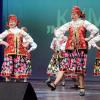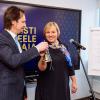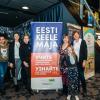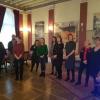Registration for Estonian language courses is going to be open soon
National minority umbrella organisations can now apply for support
Tallinn Estonian language house has opened
Integration Foundation moves to Narva
Estonian Language Centre in Narva invites students and their friends to the movies
Estonian Language Centre teachers receive diplomas
Registration for Estonian language courses is going to be open soon
 The registration period for Estonian language courses will open soon and will be available twice a year - January and August.
The registration period for Estonian language courses will open soon and will be available twice a year - January and August.
The registration for the Estonian language courses, organized by the Integration Foundation, begins on Thursday, 31st January at 10am. Additional information about these new, free of charge Estonian language courses is available on our website HERE.
As from 29th February, there will be 69 courses available and 1104 people will have the opportunity to study Estonian. Fifty per cent of the courses will be held in different cities found in the Ida-Virumaa region and the rest in Tallinn. Two different courses are planned to start in Tartu and Pärnu. The Integration Foundation offers an opportunity to study Estonian at levels A1, A2, B1, B2 ja C1.
To register, please fill in the online registration form found at HERE. We strongly advise you to test your Estonian language skills, test found at HERE, prior registration in order to choose the most appropriate course for you.
In addition to the Estonian language courses there is also a possibility to study the Estonian language in our language cafés and clubs. Eesti Töötukassa also offers different possibilities for language learning. Also within the framework of the Welcoming programme, financed by Ministry of the Interior, it is possible to study Estonian.
Estonian language studies are financed by the Ministry of Culture and for the period from 2014-2020 from the European Social Fund project ‘Activities which promotes integration within the Estonian society.
National minority umbrella organisations can now apply for support
 As of 23. January 2019, the umbrella organisations of national minority cultural associations can apply for support for their activities. The application round is designed to contribute to the sustainable operations and systematic development of the umbrella organisations and their members in Estonia. This year’s application round, financed by the Ministry of Culture, is valued at €457,000. Applications can be submitted to the Integration Foundation until 25 February.
As of 23. January 2019, the umbrella organisations of national minority cultural associations can apply for support for their activities. The application round is designed to contribute to the sustainable operations and systematic development of the umbrella organisations and their members in Estonia. This year’s application round, financed by the Ministry of Culture, is valued at €457,000. Applications can be submitted to the Integration Foundation until 25 February.
There are 18 active umbrella organisations in Estonia for national minority cultural associations, of which there are around 260 in total. The activities of the umbrella organisations represent an important resource for the country, as they have the potential to significantly boost inclusivity among national minorities and to promote stronger ties to Estonia, thus enriching society and cultural life in the country.
The 2017 study conducted by the Integration Foundation entitled ‘The impact of participating in the national cultural activities of national minorities in Estonia on their ethnic identity’ revealed that such participation increases interest in the cultures of all of the people living in the country, including Estonian culture itself. “People also tend to keep a closer eye on cultural life in the country and in the place where they live, there’s greater involvement in social and political activities, a more tangible connection’s created with Estonia and a stronger national identity emerges,” explained Irene Käosaar, the director of the Integration Foundation.
The activities of the umbrella organisations of national minority cultural associations promote cultural diversity within Estonian society and contribute to the development of a more cohesive society. Applications are open to legal entities registered in Estonia and operating under private law which have at least five members that are involved in the promotion and development of the cultural heritage of national minorities in Estonia.
Applicants must have been operating as umbrella organisations for at least two years prior to applying.
Additional information:
Kristina Pirgop
Head of Partnership Relations
+372 659 9024
kristina.pirgop@integratsioon.ee
Tallinn Estonian language house has opened
 On January 15th the Integration Foundation has opened the long-awaited Tallinn Estonian language house, were people of various backgrounds with different native languages can learn and practice Estonian as well as receive practical advice about living, learning and working in Estonia.
On January 15th the Integration Foundation has opened the long-awaited Tallinn Estonian language house, were people of various backgrounds with different native languages can learn and practice Estonian as well as receive practical advice about living, learning and working in Estonia.
The opening ceremony of the Estonian language house, which has started its work on Rävala Boulevard in Tallinn, featured the ringing of the First Bell, a tongue twister competition, guided tours and inspiring speeches. Various activities to support the Estonian language learning will be going on in the new building starting next week.
The Minister of Culture Indrek Saar, who took the floor as the patron of the opening speeches and the tongue twister competition in Tallinn Estonian language house said, “Every person who speaks Estonian is important and valuable as someone to pass on our culture. The community of people who speak our beautiful language does not necessarily have to be restricted to the ones living in Estonia. The goal has to be larger, and why not make what Mart Meri, a member of the board of the Estonian Institute, once said our next major goal: a dream of increasing the number of Estonian speakers in the world to at least 1.5 million,” minister Saar noted.
Head of the Integration Foundation Irene Käosaar said that the Estonian language house welcomes people with any other native languages regardless of their ethnicity or the Estonian language skills who would like to learn, practice or just listen to the Estonian language and faster adapt to living here. “The Estonian language house is a place where one can receive advice, support and language practice, which is the basis for people of various ethnic backgrounds and native language in finding a common language and mentality,” Käosaar noted.
“We would also like to provide a new level of the Estonian language acquisition quality in the language house we are opening today: to broaden the scope of learning methods and practice options. In addition, we will be counselling those who need it for better coping with daily life, for example, starting one’s own business or getting a doctor’s appointment. At the same time, the Estonian language house does not intend to limit its operation to the spaces we have opened today: we will gladly go out to various locations of the country,” Käosaar added.
Olga Selištševa, the head of Tallinn Estonian language house, pointed out that its functions will certainly not be limited to those of a place for formal language instruction; it is to become a cosy place for getting together. “A major share of people who have relocated to Estonia have a passive language command, and our goal is to provide them with as many opportunities for practicing Estonian as possible. We intend to organise language cafés, tandem learning and other events for faster and more intensive development of language skills,” Olga Selištševa said. “We also welcome Estonian native speakers who would like to learn some other language through tandem learning,” she added.
The participants to put their Estonian language skills to the test in the tongue twister competition held during the opening ceremony were telecom operator Mustafa Çelik, comedian Stewart Johnson and start-up owner Evgenia Trofimova. They competed in speed-reading complicated Estonian elocution exercises and reciting the most beautiful words. The patron of the competition Indrek Saar acknowledged the participants’ courage and competitive spirit and noted that anyone could master the language if there is a will, initiative and also versatile opportunities for language acquisition. It is understanding one another which is important and not how fast you speak.”
Tallinn Estonian language house will be providing a variety of language learning opportunities: language courses at different levels, tandem learning with Estonian native speakers, participation in language cafés, digital learning and practical language in the form of meetings of the Estonian language club or café. Those looking for advice will be able to request assistance in filling out documents, finding information or communicating with government agencies.
Tallinn Estonian language house located on the 6th floor of the building at 5 Rävala Boulevard is open to visitors on business days from 9:00 to 16:00. Anyone interested can contact the organisation by writing an e-mail to eestikeelemaja@integratsioon.ee or calling 6599 022.
In addition to the one in Tallinn, there are plans to open new offices of the Estonian language house in Narva at 2 Linda Street. Estonian language houses are established by the Integration Foundation, and their operation is financed by the European Social Fund and the Ministry of Culture.
Integration Foundation moves to Narva
 Since 2 January 2019 the Integration Foundation has been based in Narva.
Since 2 January 2019 the Integration Foundation has been based in Narva.
Irene Käosaar, the director of the foundation, says that moving to the border city fulfils three of the organisation’s strategic goals.
“First of all, it brings the state closer to the people of Narva,” she explained. “I like it when state agencies and public departments are dotted about a country, as they are in Estonia. And with Narva now being home, that means the state is in much more tangible reach of the people who live here.
“Another of our objectives was to offer well-educated people work opportunities in their own neck of the woods. For Narva that means 20 new highly qualified jobs, because that’s how many positions we’re opening up in the city. As things stand at the moment we have 16 people in our Narva office, the majority of whom are from Ida-Viru County. Competition for our posts has been fierce, all told, which shows that people are happy for us to be coming here.”
Käosaar says that the third and most important change that the move will bring about is the increased availability of high-quality Estonian language studies and much-needed integration support in the region, which is home to many people who speak a language other than Estonian.
“These people need greater support from the state not just in terms of learning Estonian, but in other areas of life as well, and that’s what we’re offering them in Narva,” she remarked. “The Estonian Language Centre opening in the city in summer will make our day-to-day work even more effective, and I hope people from all over Ida-Viru County will make a beeline for us!”
The main office of the Integration Foundation is on the 3rd floor of the building at Kerese 3 in Narva. “It’s a temporary home at the moment while we all eagerly await the opening of the language centre, which will be right in the heart of the city (at Linda 2) and serve not only as a place to promote Estonian but also as a proper home for the foundation,” Käosaar said. The Estonian Language Centre in Narva is scheduled to open this summer.
The foundation’s Tallinn office, which for many years was situated in Ülemiste City, relocated at the end of December to a space it shares with the Tallinn Estonian Language Centre at Rävala pst 5.
Estonian Language Centre in Narva invites students and their friends to the movies
 There is no better sight than an entire room full of people from Narva with their eyes glued to a cinema screen wondering whether the Tondikaku family will save the forest. Will the owls hoot happily ever after while the lynx frolics in the crisp white snow? Half the audience were biting their nails as they waited anxiously to find out, and some were even brought to tears!
There is no better sight than an entire room full of people from Narva with their eyes glued to a cinema screen wondering whether the Tondikaku family will save the forest. Will the owls hoot happily ever after while the lynx frolics in the crisp white snow? Half the audience were biting their nails as they waited anxiously to find out, and some were even brought to tears!
The delightful film “Eia’s Christmas at Phantom Owl Farm” speaks to you even if you don’t understand all of the words. The film night held on 3 January by the Estonian Language Centre in Narva ended with almost endless professions of thanks and appreciation. The 85 movie-goers, young and old alike, left the cinema highly satisfied with what they had seen. “Luckily the forest got saved after all!” “Did you see how cute those beavers were!” “Those kid actors were so good!” These were just some of the reactions to the film, expressed in a mix of Estonian and Russian. “Super, super, super!” said the last audience member to leave.
However, this was more than just a night of cinema: it was a night of beauty. The Estonian language in the film resounded like the gentlest drop of rain, falling like a snowflake, and gesturing to the Russian-speaking members of the audience: Come on, come with me, don’t be afraid. Of course, adding to the warm atmosphere at the event were the welcome given to the audience ahead of the film by Margarita Källo, the director of the Estonian Language Centre in Narva, and the language practice led by Estonian language teacher Pille Maffucci.
Would you be able to pronounce sentences like Nari voodi moodi voodi viidi voodi poodi or Kas ma võin või ei või võid võtta? or Kuu-uurijad on töö-ööl jää-äärel properly? Even Pille herself got tongue-tied!
Another game which was played at the cinema was familiar to many of the participants from their childhood – Chinese whispers. Not that anyone had to speak Chinese, but rather Estonian! The first person in each row whispered into the ear of the person next to them words like metskits, lumevaip, looduskaitse and maakodu, which were then passed down the line until they reached the last person. Everyone did very well: only in one row did the word piimasupp get shortened simply to piim. In the meantime, young Maria lent Pille a helping hand, asking the students questions related to the themes of the movie they were about to watch. Who had seen a real-life bear? Who had seen an elk?
“It was so lovely to kick the year off with people we’ve been teaching Estonian to since autumn,” Pille said. “It really gave the kids the chance to use the knowledge they’ve gained in their lessons in a different context. It’s the sort of opportunity we’re hoping to continue to offer our friends at the language centre in the future.”
It truly was a beautiful evening. More than that, it made for a beautiful start to the new year. (And yes, thankfully the owl was saved!)
Estonian Language Centre teachers receive diplomas
A special ceremony held on 15 December saw the Estonian Language Centre’s first 10 teachers awarded with diplomas for completing a special training programme devised by the Integration Foundation in cooperation with the Institute of Estonian and General Linguistics of the University of Tartu. The programme, which started in August and ended in December, included almost 200 hours of classroom-based learning and more than 350 hours of independent work.
 Irene Käosaar, the director of the Integration Foundation, says that the lack of qualified language teachers represents one of the greatest restrictions on the teaching of Estonian to people of other nationalities living in the country. “Interest in learning the language is growing all the time,” she explained. “So far the Integration Foundation’s been outsourcing all of its Estonian courses, but in 2019 we’re opening Estonian Language Centres in Tallinn and Narva, and in order to boost the number of people studying we’ll be starting to organise language courses ourselves as well. That’s why we worked with the University of Tartu to develop a special training programme that focuses on the specific nature of teaching Estonian as a second language to adults. I’m really glad that the 10 teachers we chose from among the dozens of candidates last spring have now all been awarded their diplomas!”
Irene Käosaar, the director of the Integration Foundation, says that the lack of qualified language teachers represents one of the greatest restrictions on the teaching of Estonian to people of other nationalities living in the country. “Interest in learning the language is growing all the time,” she explained. “So far the Integration Foundation’s been outsourcing all of its Estonian courses, but in 2019 we’re opening Estonian Language Centres in Tallinn and Narva, and in order to boost the number of people studying we’ll be starting to organise language courses ourselves as well. That’s why we worked with the University of Tartu to develop a special training programme that focuses on the specific nature of teaching Estonian as a second language to adults. I’m really glad that the 10 teachers we chose from among the dozens of candidates last spring have now all been awarded their diplomas!”
A number of the recipients have already been teaching since September. The training course examined linguistically and pedagogically important issues and it forms the basis for the teachers to start working. All 10 graduates will be putting their new skills to the test at the Estonian Language Centres in Narva and Tallinn in 2019.
